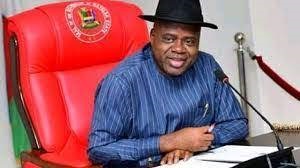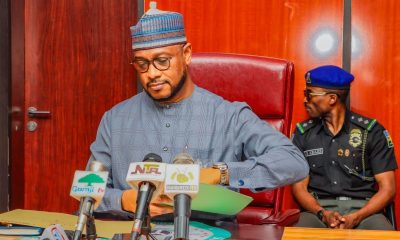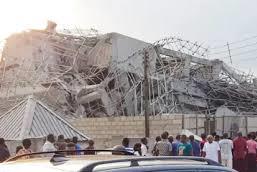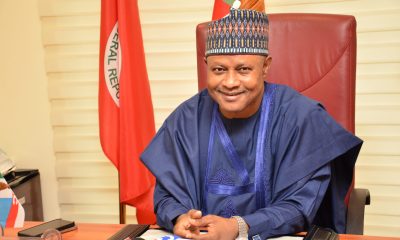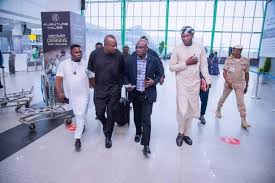OPINION
Fatigued Sovereignty: Nigerian Nationhood in Despair,
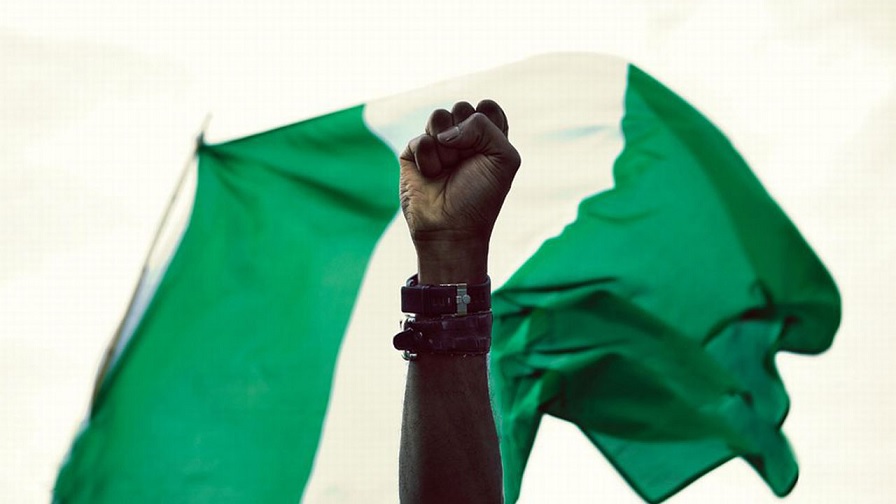
By Nimi Wariboko
Now is the time for all patriotic citizens to rise up and repair Nigeria’s fatigued sovereignty. Yes, the set time has come for all of us to make unprecedented sacrifice and show unparalleled devotion to the nation to help it avert the potential crisis of disintegration.
This moment calls for unprecedented sacrifice and devotion.
Nigeria is threatened by the forces of non-being. The affective bonds between the nation and its citizens are under titanic stress. Its sovereignty is driving to the point of breakdown. Subversive herdsmen are threatening to dismember the nation, powerful men from the east are calling for collective self-defense, and some ex-generals in the North are calling on their ethnic folks to standup and fight like hell. Some rulers in the West are predicting civil war, and ex-militants in the South-South are thinking aloud about preparing to defend their own land. Now is the time for those of us who believe in one integral Nigeria to stand up and also fight for own land, from the Sahara-kissed Sokoto to the Atlantic-washed Niger Delta.Nigeria is in despair and its sovereignty is fatigued. Her sovereignty is diminished and dispersed into armed and arming power centres and brigands. Moments such as this call for sacrifice for sovereignty, sacrifice that can stand the test of time. The nation is hurtling toward catastrophic crisis and we need to get ahead of the potential disaster. Time is running out! This is the time to defend the Union. It stands between life and death, abandoned and exposed to the vulnerability and sudden demise by the very sovereignty that should have power over the forces of chaos and violence. Nigerian citizens or groups fear that the nation is losing its grip on its sovereignty. They fear that the nation cannot actually win its struggles against the passage of time and chance; they fear that it might actually buckle under the weight of uncertainty and forces that are threatening its existence and continuity.
Our nationhood is in despair because our national sovereignty is fatigued. What does it mean for a sovereignty to be fatigued, exhausted? This is when it becomes obvious that it is getting too late for a nation to forestall disaster. It is an awareness of the citizens that their country’s sovereign power is no longer able to fittingly hold its uniting parts together, and they long for a new sovereign power to seize the critical moment and turn things around. Sovereignty is fatigued when it is losing its power to hold together its “federating” or “associating” units, when it can no longer justly hold together the nation’s past and future, presence and absence, conflicts and agreements, and when it fails to help the nation transcend the passage of time.
As our country loses control over how the associating units maintain their territorial, political, and moral boundaries, its sovereignty finds sanctuary in dispersed social orders or margins of its associating units. The units experience the threat of abandonment, and individuals within feel ontological anxieties. They now see their nation’s sovereignty as tired and tiring. The fatigue of sovereignty leads to despair; and the living experiences of citizens prompt them to search for a final solution to relieve them of its burden.
The fatigue of sovereignty reduces all recollections of the goodness of the Union to mere reminiscences of ethnic protections, rivalries, or favouritism, and the Union’s future becomes a prediction of darkness. The past of the Union and its collective goodness are at best seen as intensely personal; the difference between the personal and collective has collapsed. Individuals or associating units no longer see themselves as a hybrid of the personal and collective, private and public; only in personal, private terms. Citizens do not feel that there is something in the existence and continuity of the country that is capable of connecting them to the national order and its promise. Members of the Union — individuals and groups — begin to fall apart.
There are at least three ways to re-energise a fatigued sovereignty. First, we can demand for a strong leader, one who is charismatic, decisive and effective; a person capable of rescuing the nation’s sovereignty. Second, we can craft an ethos of strong commitment to fairness, equality, and social justice for all…
Nigeria is losing the capacity to fuse the authorities of various groups together. We face the total disintegration of our inherited social system, not to talk about generating the power to build a coherent and morally relevant social order that can subsume and transcend our ethnic and group differences. We are now acutely realizing what we always knew that the sovereignty of Nigeria has never been a sanctified representation of ourselves to ourselves. Thus, this nation cannot legitimately call on a majority of its populace to make sacrifice for its survival at this critical moment. Too many citizens believe that Nigeria has never sufficiently embodied the whole aspirations of its federating units to nationally call for commitment and sacrifice; something it needs today to stand the test of time. This is painful, but it should not be end of the story.
There are at least three ways to re-energise a fatigued sovereignty. First, we can demand for a strong leader, one who is charismatic, decisive and effective; a person capable of rescuing the nation’s sovereignty. Second, we can craft an ethos of strong commitment to fairness, equality, and social justice for all. If we know that our governments and institutions will treat us with fairness and according to merit, then there will be less interest to run into the embrace of ethnic enclaves.
Third, in the period of fatigue of sovereign, there is usually an intensified longing for a sacred myth, a kind of mythical “colossus” which can stand for what the nation is all about, its innermost identity. This is a shared meaning framework, purpose, or vision that can create a bridge between the nation’s past and the future, preventing whatever is happening in a critical moment from creating an irreparable damage. This mythos will hold the country together as it deals with its inevitable tensions and conflicts. The mythos is a shared meaning or story that would have made the present crisis eventful and transformative; that is, turn it from an end into a new beginning. Mythos helps to create a sense of unity, forging various differences and divisions into a common vision of collective human flourishing.
The problem is that Nigeria has never consciously invested in any of these three options. But now is the time to consciously develop them if we want to keep the nation that our fore-parents handed over to us as one integral body. Now is the time for all patriotic citizens to rise up and repair Nigeria’s fatigued sovereignty. Yes, the set time has come for all of us to make unprecedented sacrifice and show unparalleled devotion to the nation to help it avert the potential crisis of disintegration.
Nimi Wariboko is a Walter G. Muelder professor of Social Ethics at Boston University, USA.
OPINION
This Trial of Oloyede
By Tunde Akanni
It’s been traumatic for my entire family since that video started making the rounds. I sneaked a slight view… It’s our trial. It’s my trial. Oloyede is genuine. He is most sincere. He is modestly so, as well. For us, however, Allah knows best.
I was with a trader in the afternoon of what I considered a dark Wednesday, the 14th of May. “Se bi won ni JAMB o get mo bayi…”. I had to cut in immediately. Which JAMB? “Madam, that’s one person I will vouch, and vouch for…zero tolerance for corruption. Absolutely responsible with a high level of consciousness for the good of others. If certain things went wrong at JAMB, I agree it’s his responsibility to carry all pleasant and other burdens but just know that the bad side of the operations may as well be sabotage. I have absolute trust in that man. Ask my own colleagues about me, but Oloyede is my own hero, somebody I have known for more than 40 years…”This is by no means a reductionist disposition to the tragedy induced by the so-called computer glitch. May the Almighty God in His infinite mercy console the parents of the candidate reported to have committed suicide. May God strengthen them to survive this gloomy phase of their lives and sustain them to reap bountiful compensation that will endure in their lives. It’s hard, so hard to pull tragedies of this magnitude. I personally feel for these parents.The said computer glitch, may we never fall victim to it. Those who work for big organisations requiring a large layout of ICT operations know what I’m talking about. Rather than being ‘solutional’, IT facilities can be unimaginably problematic sometimes, yet indispensable in this civilisational dispensation. This is not doubting deliberate sabotage, as may have happened in the case of JAMB. I’ve been part of Oloyede’s JAMB journey to attest to his commitment to offer his best for the otherwise sinking board.Far from being cosmetically exhibitionist, the Oloyede-led JAMB team, led by the Education minister, Tunji Alausa, went round the critical facilities of JAMB during the just concluded examination. Alausa saw, firsthand, like never before elsewhere in this country, how far JAMB had gone in its strive for transparency and the real-time monitoring of the conduct of examinations nationwide. Alausa, beyond being in awe, sought to make the JAMB effect spread immediately to other examination bodies.No be dem say, same day, the WAEC team came to JAMB and made it into the situation room, which was my own duty post. The NECO team followed suit afterwards, both duly led around by the sturdy lead IT consultant who’s been reliably there from Oloyede’s assumption of duty, Damilola Bamiro. Far richer, given that they charge more for their exams, the duo of WAEC and NECO were suddenly mandated to understudy the examination sector leader in Africa that JAMB has become over time.The staff of both WAEC and NECO suddenly had to undertake a professional excursion led through all the real time monitoring screens and other digital facilities. It was obvious they marvelled at what they saw, revealing a functional leader-subordinate synergy manifest with trendy output that the world can see and learn from.But that may even seem like the tip of the iceberg of the output of the hard work and commitment of the nation’s foremost icon of integrity in public service. A series of far more seemingly serious strides had been accomplished by Oloyede at JAMB. As a focused scholar, he keeps ensuring that every bit of the experience of the Board is treasured as worthy data to guide future actions and even subjects for further research.Not even the agencies dedicated to emergency matters in Nigeria could have been as prompt as the Oloyede management on this ugly glitch saga. Once the complainants began ventilating into the public space, JAMB rose to the challenge without any predictably traditional arrogant stance of government is always right. I was aware that a particularly strident public critic and a former students’ leader at Obafemi Awolowo University, Adeola Soetan commended the spokesperson for JAMB for the excellent handling of public complaints.Promptly, an independent team of investigators was set up to unravel the mystery leading to the rather depressing situation that now confronts us. The team, drawn from assorted but technically relevant constituencies, has found out that no fewer than 165 centres of over 800 examination centres nationwide were affected.Obviously well prepared for whatever the outcome may turn out to be, he braced up to the challenge to embrace the surrender value to tell it to the world as it is. This trial is for all of us who believe and trust Oloyede. I am in this group. So much so that his public cry infected me…It was a patriot’s cry for his beloved country. Like me, a former Law don at LASU, Dr Kilani wasn’t any less affected as demonstrated in a quick note to me: “I write to associate myself with the pain, sorrow and emotion of our own Professor Oloyede. I could not hold my tears seeing him cry. May Almighty Allah see him through. May we all not be put to shame…”But then came a soothing message from Gbade Osunsoko, my cousin: “…He will come out of this much stronger because Nigerians will trust him far better than a number of our leaders.. A man that makes mistakes happens under him and takes responsibility – it’s a big deal in Nigeria.”With Oloyede, young Nigerians with challenges regarding sight are no longer left to moan their fate endlessly, with adequate provision for their inclusion in the UTME. How many of our public facilities are this inclusion conscious as stipulated by SDGs? How come a legacy built through almost a decade at the very best cost ever possible will be made to crumble when the game changer leader remains ever modest? JAMB has steadily risen through thick and thin to accomplish its tasks to the admiration of stakeholders, nationally and internationally, under Oloyede. Both NNPC and the Nigeria Police, being beneficiaries, can attest to the current competence of JAMB. How many other numerous stakeholders nationwide never deemed to have any relevance to JAMB before Oloyede but have since become critical, if not indispensable players?But why does this sudden saddening encounter threaten our joy of service without blemish? Why this unforeseen truncation of a good story, so intentional, coming from Africa? Whodunnit? Surely the truth shall come out for the world to perceive and assess and get to appreciate the efforts and the quantum of commitment appropriated to the JAMB excellence project driven by Oloyede.One cannot but be deeply concerned. Before the very eyes of a few of us carefully selected to give support from our respective professional perspectives from the very beginning, Professor Oloyede’s concern for genuine growth and development was real. It is still real and increasingly so, as a matter of fact. Indeed, inimitable. It shall be well.Tunde Akanni is a professor of Journalism and Development Communications at the Lagos State University, LASU. Follow him on X:@AkintundeAkanniOPINION
Democracy, Institutions, and the Rule of Law

By Kator Ifyalem
Democracy, often hailed as the cornerstone of modern governance, is a system that empowers citizens to participate in the decision-making processes that shape their lives. However, the mere existence of elections is not enough to ensure a fair, just, and prosperous society.
Without robust institutions, the rule of law, and ingrained values, democracy can become a hollow shell, susceptible to corruption, manipulation, and eventual collapse. At its core, democracy is built on the principle that power resides with the people. This power is exercised through fair elections, where citizens choose representatives to govern on their behalf. The effectiveness of this system relies heavily on the strength of supporting institutions, adherence to the rule of law, and shared values that guide societal behaviour.Institutions serve as the backbone of a democratic society, translating the will of the people into action. These include governmental bodies such as the legislature, executive, and judiciary, as well as independent organizations like electoral commissions, anti-corruption agencies, and human rights commissions. These institutions provide checks and balances, ensuring that no single entity or individual can accumulate too much power. They create a framework for accountability, transparency, and effective governance.An independent judiciary is crucial for upholding the constitution and protecting individual rights. Without it, laws can be manipulated or ignored by those in power, leading to tyranny. Similarly, a free and independent media acts as a watchdog, informing citizens and holding those in power accountable. When media institutions are weakened or controlled by vested interests, the flow of information is compromised, and citizens are unable to make informed decisions.The rule of law is another critical component of a functioning democracy. It ensures that all citizens, regardless of their status or position, are subject to the same laws and legal processes. This principle is fundamental to creating a fair and just society where everyone’s rights are protected. A robust legal framework, consistently and fairly enforced, provides the predictability and security necessary for social and economic development. It protects property rights, enforces contracts, and creates an environment conducive to investment and growth.Moreover, the rule of law is essential for protecting minority rights and preventing the tyranny of the majority. In a true democracy, the rights of all citizens must be respected, even if they are not part of the ruling majority. This protection is enshrined in laws and enforced through effective legal institutions.Values form the third pillar of an effective democracy. These shared beliefs and principles guide societal behaviour and inform policy-making. Democratic values include respect for human rights, tolerance of diversity, commitment to justice, and belief in the equality of all citizens. When these values are deeply ingrained, they act as a safeguard against authoritarian tendencies and help preserve the integrity of democratic institutions.For instance, a healthy democracy can be likened to a three-legged stool, where institutions, the rule of law, and democratic values form the legs. Just as a stool cannot stand stably without all three legs being strong and balanced, a democracy cannot function effectively if any of these elements is weak or missing. In Nigeria’s case, we’ve seen how weaknesses in one area, such as institutional challenges in election management, can put stress on the other legs, requiring the judiciary (rule of law) and civil society (democratic values) to bear more weight to maintain stability.Education plays a crucial role in instilling these values. A well-informed citizenry, aware of their rights and responsibilities, is better equipped to participate meaningfully in the democratic process. Civic education programs that teach the principles of democracy, the importance of institutions, and the value of the rule of law are essential for creating engaged and responsible citizens.The interplay between institutions, the rule of law, and values creates a self-reinforcing cycle that strengthens democracy. However, this cycle can also work in reverse. Weak institutions often lead to a breakdown in the rule of law, eroding democratic values and further weakening the system. This negative spiral will ultimately lead to the collapse of governance, even if the outward trappings of democracy remain.To prevent this decline, concerted effort is required on multiple fronts. Institutional capacity must be built and maintained through adequate funding, training, and support. The rule of law must be consistently enforced, with mechanisms in place to address corruption and abuse of power. This requires not only strong legal frameworks but also a commitment to their implementation.International cooperation also plays a role in strengthening democracy. Countries learn from each other’s experiences, share best practices, and provide support for development. However, it’s crucial to recognize that democracy cannot be imposed from outside; it must be nurtured from within.True democracy requires more than just the act of voting; it demands a comprehensive system of governance that respects the rights of all citizens, upholds justice, and promotes the common good. Strengthening these fundamental pillars (institutions, the rule of law, and values), is crucial in building more resilient, effective, and truly representative democracies that serve the needs of all citizens and contribute to global stability and prosperity. Where does Nigeria as a nation stand on this scale?OPINION
Reshaping Nigeria’s Student Loans for Inclusive Access

By Tosin Kolade
In June 2023, President Bola Tinubu signed the Student Loan (Access to Higher Education) Act into law, marking an important step forward in the country’s approach to financing tertiary education.The initiative was designed to provide interest-free loans to students in higher institutions, thereby expanding access to education for financially disadvantaged youth.
However, nearly two years on, the scheme’s implementation remains burdened by challenges, prompting growing concern and debate among stakeholders. In response to criticism of the original law, the Federal Government repealed and re-enacted the Act in April 2024.The revised legislation established the Nigerian Education Loan Fund (NELFUND) as a corporate entity responsible for managing and disbursing the loans.Notably, the amended version eliminated restrictive eligibility criteria such as income thresholds and guarantor requirements.It also extended the scheme’s coverage to include students enrolled in government-accredited vocational training centres.To streamline access, the application process was simplified, requiring only a valid National Identification Number (NIN) and Bank Verification Number (BVN).Hence, all submissions were made via the NELFUND portal.In spite of these improvements, the scheme has continued to attract criticism.One of its most vocal opponents is the Academic Staff Union of Universities (ASUU).In a recent interview with a national daily, Dr Mwolwus Jurbe, Chairman of ASUU’s University of Jos chapter, outlined the initiative as “fundamentally flawed”.He argued that the scheme was unlikely to benefit its target groups, especially students from low-income families.“The scheme is pushing education out of the reach of the common man,” he said.Jurbe said that, amid high unemployment rates and soaring tuition fees, expecting repayments from indigent students was unrealistic.ASUU also raised alarms over reports that TETFund allocations might be redirected to fund NELFUND.The body warned that dismantling a functional funding mechanism in favour of an untested alternative could jeopardise the future of tertiary education in Nigeria.Meanwhile, the National Association of Nigerian Students (NANS), while generally supportive, has also expressed reservations.The association acknowledged the potential of the scheme to reduce dropout rates, but emphasised that the absence of scholarships or grants rendered it incomplete.NANS President, Comrade Olushola Ladoja, condemned the alleged mismanagement of NELFUND, calling for the dismissal of implicated officials and the publication of the 51 tertiary institutions reportedly involved.“Any vice-chancellor, rector or provost found culpable in the mismanagement of student loans must be removed from office.“Their actions sabotage the Federal Government’s effort to make education accessible to all,’’ Ladoja said.He urged Tinubu to probe the reported diversion of N71.2 billion and criticised NELFUND for excluding the national student leadership from key stakeholder engagements.Additionally, NANS called on the EFCC and ICPC to investigate the matter and advocated for a five-year post-NYSC loan repayment grace period, citing the employment difficulties faced by many recent graduates.Civil society groups have also raised concerns.The Education Rights Campaign (ERC) described the initiative as “badly thought-out, ill-conceived and fundamentally unworkable”.Hassan Soweto, National Coordinator of the ERC, lamented repeated delays in the loan rollout, calling it evidence of poor planning and political inertia.“It is a national embarrassment that almost a year after the law was signed, students are still waiting for funds,” he said.Worthy on note, trust in the scheme further eroded in August 2024 when it was revealed that no tertiary institution in the South-East had been included in the first phase of disbursements.Reacting, the Concerned Igbo Stakeholders Forum (CISF), led by Chukwuma Okenwa, condemned the omission as a deliberate act of marginalisation.Okenwa argued that excluding an entire geopolitical zone from a national programme violated the federal character principle.Although NELFUND claimed South-East schools had failed to respond to verification notices, the CISF rejected this explanation, insisting that at least one compliant institution should have been selected.Similarly, the Corporate Accountability and Public Participation Africa (CAPPA) expressed concern over NELFUND’s plan to limit eligibility to students in “high-demand” disciplines.Zikora Ibeh, CAPPA’s Senior Programme Manager, warned that the policy could marginalise students in the humanities, arts, and social sciences.“This approach risks deepening inequality by denying support to students whose fields may not be seen as immediately profitable but are crucial to national development,” she said.Also, controversy followed the announcement that the EFCC had donated N50 billion in recovered funds to the loan scheme.A Legal expert, Nnaemeka Ejiofor, cautioned that while well-intentioned, the EFCC lacked constitutional authority to reallocate recovered public funds without National Assembly approval.“Such actions, no matter how well-meaning, set a dangerous precedent,” he warned.Meanwhile, fee hikes across federal and state universities have exacerbated the financial burden on students and their families.In some cases, tuition fees have surged by as much as 1,000 per cent.A University of Lagos student, Michelle Njemanze, shared that her tuition rose from N16,000 to N196,000 in a single academic session.For many, the student loan scheme remains a promise yet to be fulfilled.Although the Tinubu administration allocated N200 billion to the scheme in the 2024 budget and appointed banking executive Jim Ovia as chairman of the NELFUND board, disbursement delays continued well into May 2025.In response to growing dissatisfaction, NELFUND recently announced a major overhaul of its application system.NELFUND Chief Executive Officer, Mr Akintunde Sawyerr, recently revealed that the agency was deploying a fully digitised, user-friendly platform to streamline the loan process and eliminate bureaucratic delays.“Education is a right, not a privilege; with this technology-driven model, we are establishing a transparent and efficient system that puts students first,” he said.Sawyerr added that the reforms aligned with Tinubu’s Renewed Hope Agenda, which prioritised educational access and youth empowerment.According to him, more than 320,000 students had already benefited from the scheme, with thousands more undergoing verification as operations scale-up.Looking ahead, NELFUND also plans to integrate its systems with institutional portals across the country.This collaboration aims to enable seamless data exchange, automate student record verification, and speed up loan processing.While recent reforms are encouraging, experts insist that sustained political will, transparency, and inclusive policies are essential to realise the full potential of Nigeria’s student loan scheme.They agree that, in theory, the loan scheme offers a vital opportunity to democratise access to higher education in Nigeria.In practice, however, its rollout has been hindered by legal ambiguities, implementation delays, and regional inequities.If these challenges remain unresolved, experts warn, the scheme may end up widening the very educational gap it was intended to close. (NAN)



